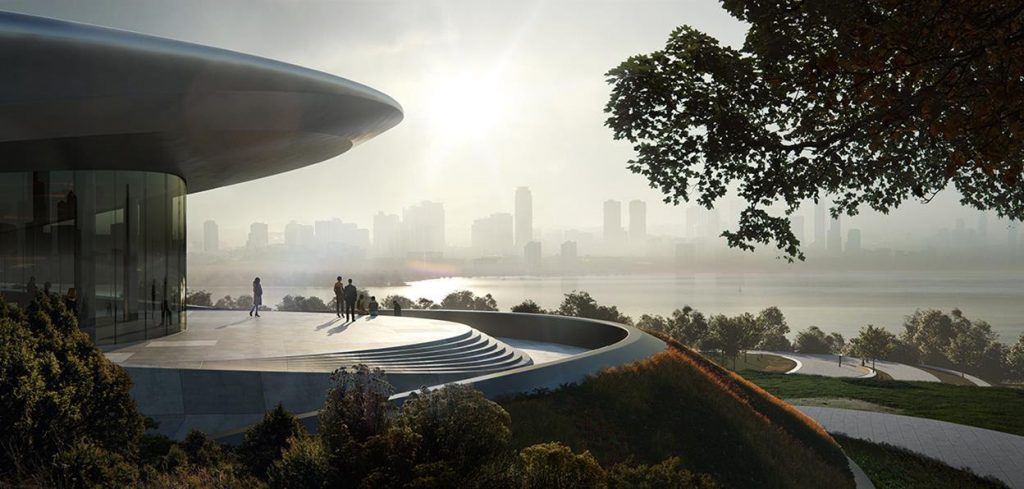
The Start-Up exhibition and conference centre, the first building within Chengdu’s Unicorn Island masterplan, is nearing completion.
With China’s economy evolving from
traditional industries to internet and technology-based organisations,
the country is now home to a third of the world’s technology start-ups
valued at over a billion US dollars – termed ‘unicorn
companies’.
Chengdu, the capital of Sichuan province, has developed into a centre of
excellence providing computer chips for half the world’s laptops and is
a leading producer of mobile computing hardware. With a focus on
next-generation information technologies, intelligent
manufacturing, digital entertainment and new energy, the Tianfu New
Area to the south of the city is being developed as an ecologically
sustainable civic, business and residential centre for China’s
technology and research sectors.
The 67-hectare Unicorn Island masterplan within the Tianfu New Area will
foster the continued growth of China’s digital economy, creating living
and working environments for Chinese and international companies.
A mixed-use masterplan for 70,000 researchers, office staff, residents
and visitors, Unicorn Island has been designed to enhance the wellbeing
of its community; its design influenced by principles within the
region’s historical natural engineering projects.
Constructed 2,300 years ago to the northwest of Chengdu, the nearby
Dujiangyan irrigation system on the Min river was named a UNESCO world
heritage site in 2000. This ancient water management system deployed the
river’s natural forces to irrigate the Chengdu
plain, creating some of the most productive agricultural land in China
and protecting the region from flooding.
Contemporary hydraulic engineering is
also re-establishing the wetlands of the Tianfu New Area as part of a
comprehensive ecological project that serves as water conservation,
flood control and recreation area.
Driven by the environmental principles of Dujiangyan’s historic
irrigation system and Tianfu New Area’s ongoing work to re-establish its
natural wetlands, Unicorn Island’s parkland design incorporates green
civic spaces, water conservation and enhanced connectivity
to create its living and working environments; following concepts that
are redefining the true measure of a building’s efficiency as the
improved wellbeing of its inhabitants.
Integrated clusters of buildings surround Unicorn Island’s central plaza
and metro station; its radial masterplan enables the entire island to
be accessed by a few minutes’ walk or bike ride.
The height and composition of each cluster will be established
organically over the lifetime of the development; directly responding to
varying requirements of function, programme and efficiency to cultivate
a diversity of interconnected buildings at a human
scale that establish a sense of community.
Within new parklands bordering Xing Long Lake, Unicorn Island will incorporate natural water management systems and include innovations in urban farming technologies to provide residents, workers and visitors with fresh, locally-grown produce.
Source :
Zaha Hadid Architects (ZHA)
 Le mie ricette per la real estate community
Le mie ricette per la real estate community